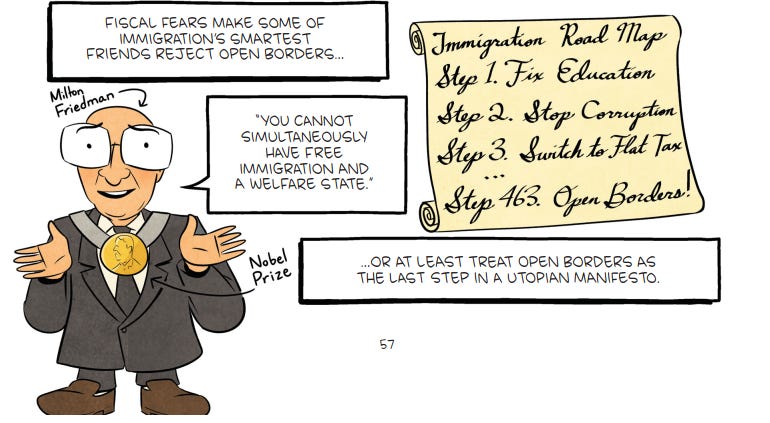
Should the United States Limit Immigration Based on Merit?
My opening statement for my LibertyCon immigration debate against Daniel DiMartino
On February 7, the noble John Papola moderated the LibertyCon immigration debate between myself and Daniel DiMartino. Here’s my opening statement.
We’re all thrilled that Ross Ulbricht, the man who created a tax-free platform for selling illegal narcotics, weapons, and much more, now freely walks the streets of America. But what should libertarians think about people born in other countries who illegally come here to grow food, wash dishes, clean hotel rooms, and care for kids? Shouldn’t we support massive government efforts to exclude and deport them of all people?
To answer my own rhetorical question: Obviously not. If libertarians won’t stand up for the rights of foreigners that our government treats like criminals for doing hard jobs without getting government permission — permission that is, by the way, almost impossible for them to obtain — then we stand for nothing and we are nothing.
I’m happy to have Daniel DiMartino, a young Venezuelan getting a Ph.D. at Columbia University, here in the country with me. And I’d be happy to welcome the rest of Venezuela here, too, even though almost none of them are likely to match his educational success or future tax payments.
Warning: If you absorb the information being offered this weekend at some of the LibertyCon sessions on educational alternatives and tax avoidance, you may not be finishing college or paying a lot of taxes either.
Of course, most people aren’t libertarians, and as you’ve noticed, it’s hard to change their minds about that. While non-libertarians are usually skeptical about immigration, they’re usually especially skeptical about low-skilled/low-education immigrants. Their main argument? These immigrants are especially likely pay little in taxes, use more in services, and therefore to be, on balance, a net fiscal burden on taxpayers.
Milton Friedman was so convinced by this argument that he publicly declared, “You cannot have a welfare state and free immigration.” Which is mathematically premature. Like many other scholars, Daniel DiMartino has gone far beyond Milton’s fear-mongering by carefully crunching the numbers. If you have opinions about this issue but have never actually looked at tax and spending numbers, please try to be more like Daniel.
Here’s a quick summary of the implications of Daniel’s assumptions:
1. Immigrants have better fiscal effects than otherwise identical natives.
2. Regardless of your nativity, we should expect you to be a net burden on taxpayers unless you finish college.
The easiest reply to this model: Even low-skilled workers contribute something to society besides taxes. Namely: goods and services! We should definitely count that contribution for both natives and foreigners before deeming anyone a “net burden.” It’s not just rude to call janitors a “net burden on society”; it’s absurdly false.
The next easiest reply: What were all of Daniel’s assumptions, again? We lack time to review them in detail, but he generously shared his model with critics, so we already know that very reasonable changes in Daniel’s assumptions make net fiscal impacts for low-skilled workers dramatically better.
All this aside, using the welfare state to argue against immigration is an extreme case of using a sword to kill a mosquito. Even the most incompetent government in the world can instantly switch an immigrants’ fiscal impact from negative to positive by excluding him from government benefits. In slogan form: “Build a wall around the welfare state, not the country.” There’s nothing unrealistic about this proposal: We already heavily restrict both benefit eligibility AND naturalization for non-citizens. There’s no reason we couldn’t increase these restrictions enough to ensure positive fiscal impacts for all migrants. Indeed, if all the critics of immigration had spent the last forty years single-mindedly trying to restrict immigrants’ benefit eligibility, they probably would have won long ago.
Is it un-American to restrict benefits? I think it’s un-American to treat farmers, dishwashers, hotel maids, and nannies like criminals because the government refuses them a license to work for willing employers, rent from willing landlords, and shop from willing merchants.
The idea that the people of the United States collectively own this country and have a right to decide who lives here has a name, and that name is socialism. Don’t forget it.

















My devil's advocate argument would be that there is more to the public's skepticism than just data. It's tribal, cultural, and emotional. Although it's true that minds are resistant to change, it would be inaccurate to ignore the depth of this resistance by dismissing it as ignorance. Even with an impenetrable model, people would continue to advocate for "America First."
Furthermore, even though "build a wall around the welfare state" makes sense in theory, too many voters adore their benefits and don't care who foots the bill, making it an unpopular political strategy in reality. Voters are unlikely to support a policy that singles out immigrants for exclusion if they don't give a damn about who pays for it. Even though the logic is sound, it could worsen the situation by inciting a backlash (imagine charges of "unfairness" or "discrimination"). Politicians are aware of this and would prefer to accommodate it rather than propose a solution that might annoy voters.
"Even low-skilled workers contribute something to society besides taxes."
Yeah, they take up space, dilute the existing capital stock per capita, vote differently (worse) then natives, and degrade social trust and pro-social action.